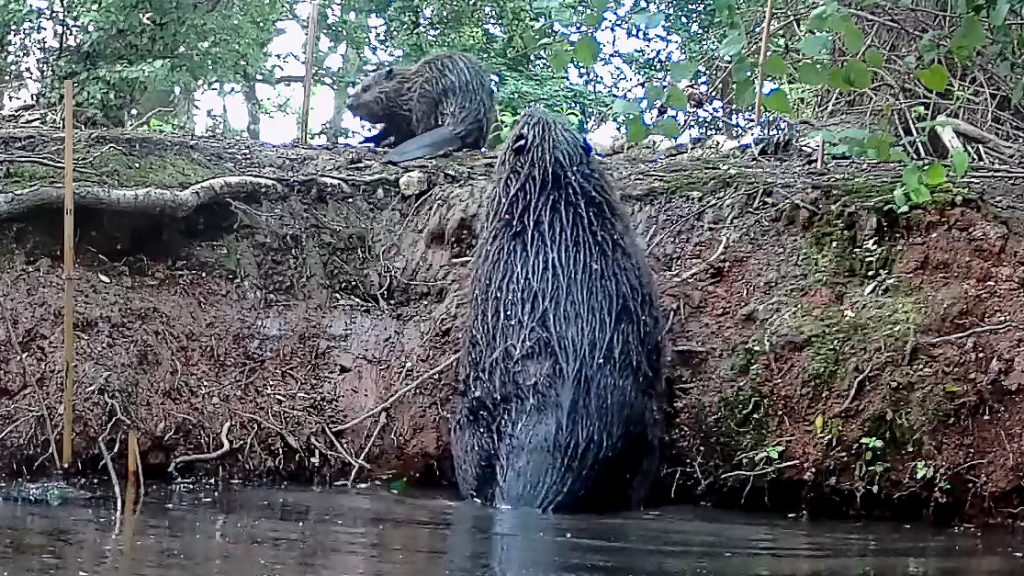Staffordshire Welcomes First Beaver Birth in 400 Years within Britain’s Largest Enclosure at Trentham

After reintroducing a family of beavers earlier this year to the largest beaver enclosure in Britain, Trentham, in Staffordshire, has announced that the beaver family is growing. The expert team has confirmed that the female has given birth, demonstrating the success of relocating these ‘ecosystem engineers’ to suitable landscapes.
Earlier this year, the Grade II* listed Trentham Gardens, designed by Capability Brown, welcomed beavers into a 182-acre enclosure and parkland lake setting.
Supported by experts at Beaver Trust, the family of Eurasian beavers, a native British species known for their keystone effect and benefits they bring to ecosystems, was reintroduced to the historic landscape which features a mile-long serpentine lake and historic woodland.
In a remarkable success story for the project, Trentham has confirmed that the female has given birth, showcasing a thriving reintroduction. This incredible occurrence comes after a mere 3 months since their relocation from Scotland in March of this year.
Beavers breed once a year, mainly from December to April and litters of usually two to three kits are born in May or June. The young learn to swim within hours and leave the lodge at 1 – 2 months. They are weaned in their first summer but may not become independent until two years old.
Harvey Tweats, Beaver & Wildlife Ranger at Trentham had his suspicions the female may have been pregnant as she had not been spotted away from the lodge for some time. After testing the theory by putting an apple on a stick to get a good view of her underbelly, he consulted with experts from across the world to get confirmation. Later, the team managed to get a closer look and confirmed the birth.
Whilst the news is incredibly exciting, it’s important to note that beaver kits are vulnerable to predation by foxes, birds of prey and otters – so not all kits survive. Harvey Tweats, commented: “We are thrilled that the beavers have bred and so soon too. The kit appears fit and healthy, and it is incredible news for the estate and Staffordshire as a whole. This project demonstrates just how successful the relocation of beavers to suitable landscapes can be. We’re proud to be bringing back this important keystone species to England and can’t wait to see the new addition exploring their surroundings.”
Carol Adams, Trentham’s Head of Horticulture and Biodiversity, has also been instrumental in the project and is looking forward to offering visitors an insight into beavers’ activity as the Gardens support their cultural reintroduction to Britain, a core part of the project which has been supported by Beaver Trust.
“This is such amazing news and a positive step in establishing a keystone species back into a historic landscape, it will be fascinating to see how the kits get to grips with their surroundings and how the adult beavers take to parenting a larger family.
“We hope that visitors will be equally inspired by the new arrivals and want to learn more about them and feel empowered to support beavers in the landscape by experiencing their return here at Trentham.”
Carol added: “Whilst we can’t wait to share this news with the public, it’s important that visitors are mindful of the new arrival and don’t disturb them. The kit will need plenty of peace and quiet to bed in, so we ask that visitors stick to the footpaths, keep a respectful distance from them, and keep dogs under close control.”
As part of its plans to engage with the local community, Trentham recently introduced two new wildlife initiatives, including Wildlife Wednesday’s which feature a Beaver Dusk Safari and Wildlife Cruise, offering people the chance to learn about Trentham’s commitment to conservation and spot a range of wildlife.
Eva Bishop, Head of Communications at Beaver Trust, commented; “Beaver Trust is pleased to be able to collaborate with organisations like Trentham and to encourage relocation into suitable sites. Whilst we share the good news of relocated beavers settling well into well planned and managed enclosures, we continue to urge the Government to support the wider restoration of this species and produce a licensing framework for wild releases in England.”
Beavers engineer their habitat by felling and coppicing trees, digging canals, burrowing and building dams where greater water depth is needed for their own safety. They create biodiverse wetlands where many other species can thrive.
Trentham Gardens is already home to a range of wildlife and plant species, including kingfishers and water voles. Within the main lake itself there are important nesting trees used by herons and egrets. Although beavers will generally be left to modify their new home as they see fit, certain trees will be protected to ensure these species can coexist. It has been well documented that beavers serve to generate habitat for multiple other species created through their dynamic activities.
Enclosed beaver projects remain essential to continue the species’ restoration in England, while a robust licensing framework for wild releases is awaited from Defra.
Alastair Budd, Senior Director of Trentham, comments: “We are incredibly excited to welcome new beaver kits to Trentham and further Trentham’s commitment to sustainability and biodiversity.
“The news of this kit born into Britain’s largest beaver enclosure is not only a huge win for Trentham, but the wider region, helping to ensure Staffordshire’s visitor economy continues to develop and thrive.” Alastair adds: “Our work at Trentham will establish a unique and special place for the public to engage and learn more about the species and their vital role. Beavers are one of the most important species in our habitats and we want to help visitors to understand why this once extinct British native should be back in the English countryside, helping to restore our ecosystems and mitigate the impact of climate change.”